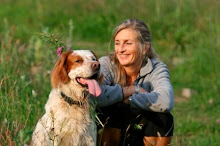 The Winner of The Companionship Award for HCAB Short Films 2008 is Andrea Hansen for her short film "A lesson in Love".
The Winner of The Companionship Award for HCAB Short Films 2008 is Andrea Hansen for her short film "A lesson in Love".
Monday, April 20, 2009
The Companionship Award
Posted by Tamara Shardlow at 2:29 PM 0 comments
Thursday, April 16, 2009
Obama’s Final Choice - The Portuguese Water Dog
 On April 11 2009, Bo, a 6-month-old Portuguese Water Dog, was given to U.S. President Barack Obama’s two daughters Sasha and Malia by American Senator, Edward M. Kennedy.
On April 11 2009, Bo, a 6-month-old Portuguese Water Dog, was given to U.S. President Barack Obama’s two daughters Sasha and Malia by American Senator, Edward M. Kennedy.
Obama promised his daughters a puppy if he won last year’s election and the gift from the senator was in response to the victory.
Dogs like Bo may look like Poodles, but are in fact water spaniel breeds of gun dogs originally bred to herd fish into nets, retrieve lost tackle and act as couriers from ship to ship or ship to shore. Such a hard working background makes them highly intelligent and loyal companions with great stamina.
However, the Obama’s would be well advised to recognise that such qualities also mean that regular time should be dedicated to vigorous exercise, thorough grooming and committed training routines. Taking these actions will help to address destructive tendencies that arise from boredom and loneliness.
Portuguese Water Dogs need a daily walk of 20 – 30 minutes at least with a regular swim at the local beach or Dog Lake. Importantly, their ears should be cleaned each week - especially after swimming - to prevent disease
And while we can assume that the Obama’s were seeking an energetic dog to complement their active lifestyles, another quality that gained much press was the importance of obtaining a dog that had a low shedding coat. No breed of dog is completely hypoallergenic, however, some – like the Portuguese Water Dog have a tendency to cause fewer problems. This quality has seen the Portuguese Water Dog gain in popularity in recent years although it is still a rare breed in Australia.
No-shed or low-shed breeds that are more commonly available include the Poodle, Bichon Frise, Maltese, Schnauzer, West Highland Terrier and Scottish Terrier breeds. Purposely bred crosses like Golden Doodles also have the no-shed coat.
Regular grooming of such dogs is essential as the coats do not shed and need to be brushed thoroughly several times a week to prevent matting and tangling.
Bo can expect to be skidding and prancing across the marbled floor of the Whitehouse for the next 12 – 14 years and grow to a medium height of 40-50 cm high and weigh between 16-25kg.
The puppy was originally named Charlie, but Malia and Sasha Obama rechristened him Bo in honour of their cousin's cat of the same name. Their parents are said to call the dog "Diddley" because Mrs Obama’s father was nicknamed Diddley, after the musician Bo Diddley.
Posted by Tamara Shardlow at 8:24 AM 0 comments
Labels: children, dog, dog breeds, dog training, dog walking
Wednesday, April 15, 2009
Does your dog rule the roost?
 Recently I had a behaviour consultation with a client who had an all too common problem – her dog ruled the roost! Rupert; a gorgeous little toy poodle, had been somewhat spoilt and allowed to get away with a little too much. The behaviour which concerned his owner the most was his constant barking at visitors, growling when he didn’t want to be picked up, urinating in the house and acute separation anxiety.
Recently I had a behaviour consultation with a client who had an all too common problem – her dog ruled the roost! Rupert; a gorgeous little toy poodle, had been somewhat spoilt and allowed to get away with a little too much. The behaviour which concerned his owner the most was his constant barking at visitors, growling when he didn’t want to be picked up, urinating in the house and acute separation anxiety.
When we discussed Rupert’s behavioural history and how he fits in with the household it came to light that Rupert was treated a bit like royalty. He slept in his owner’s bed, had access to food whenever he wanted, was allowed free range of the house and had no rules or boundaries set in place for him. This, together with his outgoing personality, resulted in Rupert assuming the position of “top dog”.
In order for his family to get some peace, Rupert needed to be brought down a peg or two. I recommended several strategies to Rupert’s owner which involved changing the way they interact with him to make him realise that he does not rule the proverbial roost. Among them was to introduce daily five minute training sessions, where Rupert is asked to perform simple tasks such as “sit”, “drop” and “stay” and is rewarded with treats for his efforts. Another was to feed him at specific times rather then allowing him control over his food intake. Additionally, Rupert was no longer allowed to sleep in his owners bed and was to be given his own bed on the floor. To relieve his separation anxiety Rupert’s owner was instructed to ignore Rupert 10 minutes prior to leaving for the day, and again for 10 minutes upon arriving home. This reinforces that her absence was no big deal and nothing to be anxious about rather than a terrible experience.
So far so good - It’s only been a week and Rupert’s owner has reported that they have already seen positive changes in his behaviour. Rupert is learning that being top dog isn’t all it’s cracked up to be.
Posted by Dr Kate Mornement at 9:27 AM 0 comments
Labels: boundaries, dog, rules, spoilt






